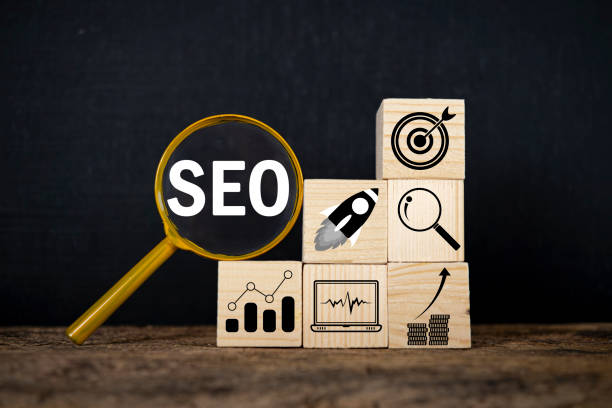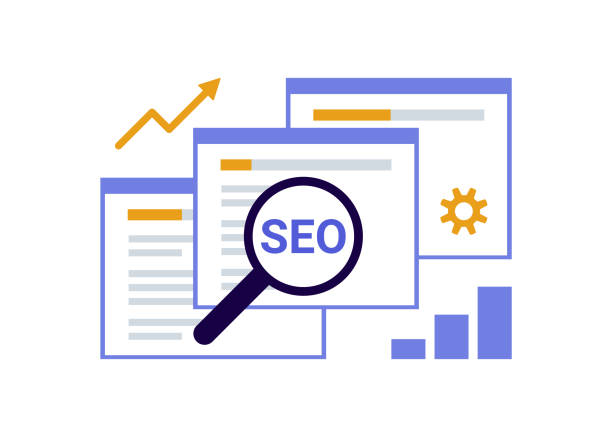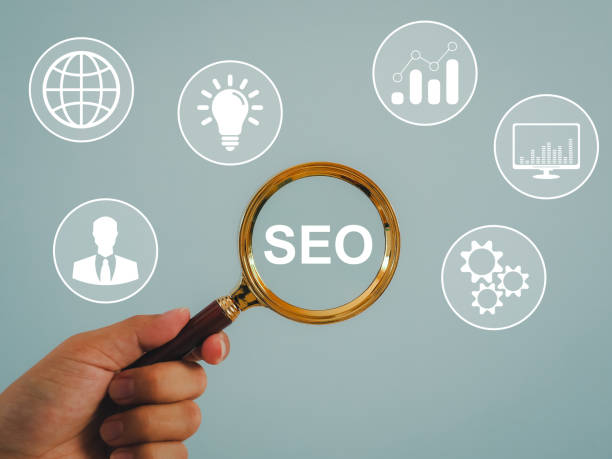Introduction to Off-Page SEO and its Importance in Ranking

Off-Page SEO refers to a set of activities performed outside your website, with the primary goal of improving your site’s ranking in search engine results pages (SERPs).
These activities signal to search engines that your website is credible, trustworthy, and relevant.
In today’s competitive world, merely having a beautifully designed website and high-quality content is not enough; one must strive to be seen among a multitude of competitors.
Therefore, understanding the #key #concepts of Off-Page SEO and implementing it correctly is vital for any online business.
This section serves as an #explanatory guide, introducing you to the importance and foundations of Off-Page SEO.
One of the most important factors in Off-Page SEO is backlinks. Backlinks are essentially links from other websites to your website.
Search engines treat these links as votes of confidence for your website.
The more high-quality backlinks you have from reputable and relevant sites, the higher your website’s Domain Authority will be.
This directly impacts your ranking.
Beyond backlinks, Off-Page SEO also includes activities such as social media sharing, brand mentions in blogs and news, and engagement in relevant forums and communities.
The ultimate goal of all these activities is to increase credibility, brand awareness, and ultimately attract more organic traffic to your website.
Without a strong Off-Page SEO strategy, even the best On-Page SEO content may not be seen well.
This is an indispensable component of a comprehensive search engine optimization strategy that significantly contributes to the sustainable growth of your business.
It is crucial to understand that Off-Page SEO is a time-consuming process, and its results appear gradually.
Success in this field requires patience, persistence, and continuous, strategic implementation.
Instead of focusing solely on the quantity of backlinks, you should focus on their quality.
A single link from a reputable and relevant site is far more valuable than dozens of links from worthless and spammy sites.
In this article, we will delve into various aspects of Off-Page SEO and provide practical solutions for strengthening it.
This explanatory approach helps you build a strong foundation for understanding how to improve your website’s position in search results.
The importance of Off-Page SEO lies in signaling to search engines that your content is recognized and referenced beyond your website’s boundaries, which itself is a sign of value and credibility.
Is your online sales not as expected? With Rasab, permanently solve the problem of low sales and poor user experience!
✅ Increase visitor-to-customer conversion rate
✅ Create an enjoyable user experience and increase customer trust
⚡ Act now to receive a free consultation!
Key Components of Off-Page SEO and How They Interact

To deeply understand Off-Page SEO, it is essential to familiarize ourselves with its main components and how they interact.
This educational section clarifies the core structure of this process for you.
The three fundamental pillars of Off-Page SEO are backlinks, social signals, and brand mentions.
Each of these components plays a vital role in strengthening your website’s credibility and ranking, and their correct combination can have a profound impact on your SEO performance.
Backlinks, as previously mentioned, act as references from other websites to your site.
The quality, quantity, and topical relevance of backlinks are of high importance.
A backlink from a website with high authority and relevance to your field of activity can have a very positive impact on your domain’s credibility.
Social signals refer to the extent of your content’s sharing across various social media platforms such as Twitter, Facebook, LinkedIn, and Instagram.
Although some experts believe that social signals do not directly impact rankings, ample evidence suggests that these signals can indirectly influence Off-Page SEO and ultimately rankings.
Increased sharing means greater content visibility, more direct traffic, and a higher probability of acquiring natural backlinks from other websites.
This process directly contributes to your content’s credibility and popularity in the eyes of search engines.
Brand Mentions are also of increasing importance in Off-Page SEO strategy.
These mentions occur when your brand name or products are mentioned in blogs, news articles, podcasts, or even in online discussions without a direct link to your website.
Search engines have become smarter and can identify these unlinked mentions, considering them as a signal of your brand’s credibility and popularity.
A successful Off-Page SEO strategy encompasses all three of these components and strives to synergistically combine them.
For instance, high-quality and engaging content that both attracts backlinks and is shared on social media will naturally lead to an increase in brand mentions.
This dynamic and harmonious interaction among different components is the key to success in this area and ensures powerful Off-Page SEO.
Ultimately, the educational approach of this section helps you create a roadmap for implementing effective strategies in this field.
Acquiring Quality Backlinks: The Backbone of Off-Page SEO

Backlinks are undoubtedly considered the backbone of Off-Page SEO.
But how can one acquire high-quality backlinks and avoid harmful ones? This specialized section delves into the types of backlinks, quality factors, and link-building methods.
The most crucial point in link-building is quality over quantity.
A backlink from a reputable website with high authority (such as a university, government organization, or well-known news outlet) that is relevant to your field of activity can be far more valuable than hundreds of backlinks from irrelevant and spammy sites.
Search engines have become increasingly smarter at distinguishing between natural and unnatural links, and spammy or purchased links can lead to penalties for your website.
Types of backlinks include natural links (Editorial Links) that are created automatically and without your request due to your high-quality content, self-created links (Self-Created Links) which include links in social media profiles, directories, and forums, and manual links (Manual Links) obtained through outreach and requests from other websites.
The focus should be on acquiring natural and high-quality manual links.
Quality factors of a backlink include the Domain Authority of the source site, the topical relevance of the source site to your site, appropriate and natural Anchor Text, and the link’s placement within the content (links placed in the main body of the content are more valuable than footer or sidebar links).
Also, the link should be dofollow to pass its SEO value.
In the realm of Off-Page SEO, link building should not become an artificial process.
The best strategy is to produce valuable and engaging content that naturally encourages others to link to you.
Strictly avoid Black Hat SEO link-building methods, which include buying links, excessive link exchange, or using Private Blog Networks (PBNs).
These methods might be effective in the short term, but will lead to penalties by search engines and loss of rankings in the long run.
Below, we have compared high-quality and low-quality links in an Off-Page SEO strategy:
| Feature | Quality Backlink | Low-Quality Backlink |
|---|---|---|
| Source | Reputable and relevant websites (e.g., universities, news, industry) | Spammy, irrelevant, low-authority websites |
| Topical Relevance | Highly relevant to your content | Irrelevant or with little relevance |
| Link Placement | In main and natural content | Footer, sidebar, spam comments |
| Link Type | Mostly dofollow (with nofollow balance) | Often excessive dofollow or only nofollow without value |
| Anchor Text | Natural and diverse (brand name, URL, relevant keywords) | Over-optimized for specific keywords |
| Purpose | Adding value for the user and credibility for the site | Solely manipulating rankings |
Building a healthy and powerful link profile requires continuous time and effort, but its impact on your Off-Page SEO and site ranking is undeniable.
This is a long-term investment for your online success.
Although Off-Page SEO has its complexities, understanding these specialized concepts correctly can lead to desirable results.
Effective Link-Building Strategies to Strengthen Off-Page SEO

After understanding the importance of backlinks, the next step is to learn practical strategies for acquiring them.
This section, as a comprehensive guide, helps you develop a structured plan for link building and strengthening your Off-Page SEO.
One of the most effective methods is Guest Posting.
In this method, you write high-quality content for another blog or website relevant to your business, and in return, you receive one or two links to your site.
Choosing high-authority and relevant websites is key to success in this strategy.
Another method is Broken Link Building.
In this technique, you search for broken links (links that lead to 404 pages) on other websites.
Then, you contact the site administrator and suggest replacing the broken link with a link to your relevant and high-quality content.
This method both builds links for you and helps improve the host site’s user experience.
Additionally, creating linkable assets such as infographics, case studies, free tools, and comprehensive guides naturally encourages others to link to you.
Due to their high value, these types of content go viral and attract numerous natural links, which are highly beneficial for Off-Page SEO.
Participating in online forums and communities related to your field is an opportunity to create Nofollow links (which do not directly pass SEO value but generate referral traffic and brand awareness) and also to gain brand mentions.
By providing useful and valuable answers and actively participating, you can establish yourself as an expert in your field.
Reputable and local online directories can also be a good source for backlinks, especially if you have a local business.
These strategies are all part of a comprehensive approach to strengthening Off-Page SEO.
It’s important to always strive for building natural and valuable relationships with other websites, not just creating links.
This guided approach will not only help you acquire more backlinks but also ensure that these links are of high quality and contribute to improving your position in search results.
By implementing these strategies, you will take effective steps towards strengthening your Off-Page SEO profile.
Are you tired of your e-commerce site having visitors but no sales? Rasab solves your main problem with professional e-commerce website design!
✅ Significant sales increase with targeted design
✅ Flawless user experience for your customers
⚡ Get a free consultation!
Brand Mentions and Online Reputation Management in Off-Page SEO

Beyond backlinks, Brand Mentions and online reputation management play a significant role in Off-Page SEO.
This analytical section examines how these factors influence your site’s credibility and ranking.
Search engines like Google have become increasingly smarter and can identify the connection between a brand name and related content, even without a direct link.
These mentions, whether in news articles, blogs, podcasts, or even on social media, are considered signals of a brand’s popularity and credibility.
The more your brand name is mentioned and in more reputable sources, the more search engines will trust it.
Online Reputation Management (ORM) is also an integral part of Off-Page SEO.
Your online reputation directly impacts users’ and search engines’ perception of your brand.
Positive customer reviews, website reviews, and positive feedback on social media all contribute to strengthening your online reputation.
Conversely, negative reviews or reputation crises can severely harm your SEO and site traffic.
Regular monitoring of brand mentions and user reviews, professional responses to feedback (both positive and negative), and efforts to publish positive and valuable content are all key activities in ORM.
A successful Off-Page SEO strategy not only seeks to acquire links but also aims to build a strong and popular brand.
Increasing brand awareness through Public Relations (PR) campaigns, participation in events, and creation of viral content can lead to a natural increase in brand mentions.
Additionally, active engagement on social media and encouraging users to share their experiences with your brand helps strengthen these signals.
For instance, if you launch a new product or service and your brand name is widely mentioned in specialized media and blogs, even without a direct link, this itself is a positive signal for search engines regarding your brand’s importance and popularity.
This comprehensive analysis shows that Off-Page SEO goes beyond mere link building and includes creating a strong and positive online presence for your brand.
Ultimately, paying attention to these intangible yet powerful aspects in Off-Page SEO can provide you with a sustainable competitive advantage.
The Role of Social Networks in Strengthening Off-Page SEO
![]()
Initially, it might seem that social networks do not have a direct impact on Off-Page SEO, but the truth is their role is indirect and very strong.
This entertaining yet informative section explores how to utilize the potential of social networks to improve your Off-Page SEO.
Imagine you have created incredibly engaging and creative content.
What happens if this content is shared and goes viral on social networks like Instagram, Telegram, or LinkedIn?
Firstly, an increase in referral traffic from social networks to your site can be a positive signal for search engines, indicating your content’s popularity.
Secondly, the more your content is seen, the higher the probability that other websites and blogs will link to it (i.e., you acquire natural backlinks) increases.
This is what directly impacts your Off-Page SEO.
Active engagement on social networks, responding to comments, holding contests and challenges, and interacting with your audience not only help increase your brand awareness but also ensure your content reaches more people, creating more link-building opportunities.
This approach is especially vital for strengthening Off-Page SEO in highly competitive industries.
Furthermore, business profiles on social networks (such as a Facebook page, LinkedIn profile, or YouTube channel) can serve as a source of Nofollow backlinks.
Although these links do not directly pass SEO value, they can drive direct traffic to your site and help strengthen brand mentions.
Do not forget that Off-Page SEO is a complete ecosystem, and social networks are an indispensable part of this ecosystem that contributes to your site’s credibility and popularity in the eyes of search engines.
Consequently, planning for an active and strategic presence on social networks not only helps your marketing goals but also indirectly leads to strengthening your position in search results.
So let’s turn social networks into a powerful tool for Off-Page SEO with a little creativity and fun!
Key Tools and Metrics for Off-Page SEO Analysis

In the world of Off-Page SEO, without using the right tools and correctly understanding key metrics, you would be navigating in the dark.
This section, with a thought-provoking content approach, helps you ask: “Do you truly know how to measure and improve your Off-Page SEO performance?” The answer lies in your ability to use analytical tools and interpret their data.
Tools such as Ahrefs, Moz Link Explorer, Semrush, and Majestic, provide invaluable information about your and your competitors’ backlink profiles.
These tools allow you to examine factors such as: total number of backlinks, number of referring domains, Domain Authority/Rating, Spam Score of links, anchor texts used, and the velocity of link creation.
By analyzing these metrics, you can evaluate the health of your backlink profile and identify its strengths and weaknesses.
For example, if you notice that your number of referring domains is significantly lower than your competitors, this indicates a need for greater focus on link-building strategies.
Or, if the spam score of some of your links is high, you should consider disavowing them (preventing search engines from considering those links for your site).
These analyses are crucial for successful Off-Page SEO.
Other important metrics in Off-Page SEO include the link growth rate, the diversity of referring domains (not just the number of backlinks from one domain), and the quality of linking sites.
Are your links from relevant and reputable sites? Are the anchor texts natural and diverse? Is your link growth not unnatural and sudden? These are questions whose answers can help you make strategic decisions.
Below, a table of important tools and their metrics for Off-Page SEO analysis is provided:
| Tool Name | Key Metrics | Main Use |
|---|---|---|
| Ahrefs | Domain Rating (DR), URL Rating (UR), Backlinks, Referring Domains, Organic Keywords | Comprehensive backlink analysis of competitors, finding link-building opportunities |
| Moz Link Explorer | Domain Authority (DA), Page Authority (PA), Spam Score, Linking Domains | Assessing domain and page authority, identifying toxic links |
| Semrush | Authority Score, Backlinks, Referring Domains, Link Building Tool | Analyzing your and competitors’ backlink profiles, managing link-building campaigns |
| Majestic | Trust Flow (TF), Citation Flow (CF), Backlink History | Evaluating backlink quality and quantity, reviewing link history |
Regular use of these tools and a deep understanding of their metrics allow you to optimize your Off-Page SEO strategy and avoid mistakes.
Without these analyses, improving site ranking in SEO competitions will be very difficult.
So, the question is: Are you ready to use these tools to master Off-Page SEO?
Common Mistakes in Off-Page SEO and How to Avoid Them

Off-Page SEO, despite its high potential for rank improvement, can act like a double-edged sword.
Common mistakes in this area not only fail to yield positive results but can also lead to severe penalties from search engines.
This explanatory section introduces you to the most common mistakes and ways to avoid them, so you can achieve sustainable and effective Off-Page SEO.
The first and perhaps most important mistake is focusing solely on the quantity of links instead of their quality.
Some individuals mistakenly believe that the more backlinks, the better, and proceed to buy worthless links or create spammy links through irrelevant sites.
This approach is highly detrimental and easily detected by Google’s algorithms.
The second mistake is excessive and unnatural use of keyword anchor texts.
If all your backlinks have the exact same keyword as their anchor text, this sends a negative signal to search engines that you are manipulating rankings.
A healthy backlink profile should have natural diversity in anchor texts, including brand names, URLs, related phrases, and keywords.
The third common mistake is ignoring the quality of linking sites.
Receiving links from sites with high spam scores, low-quality content, or Private Blog Networks (PBNs), can severely damage your backlink profile.
Always pay attention to the authority, relevance, and credibility of the linking sites.
The fourth mistake is lack of regular monitoring of your backlink profile.
Toxic links might be created automatically or by competitors against you (Negative SEO).
Continuous monitoring with tools like Ahrefs or Semrush allows you to identify these links and, if necessary, use Google’s disavow tool to ignore them.
The fifth mistake is disregarding the importance of high-quality content for natural link building.
If your content is not valuable, informative, and engaging, no one will naturally link to it.
Producing valuable content is the cornerstone of a successful Off-Page SEO strategy.
Finally, lack of diversity in link-building strategies is also a mistake.
Relying on just one method (like only guest posting) can create limitations.
A comprehensive strategy should include various methods such as public relations, social media, broken link building, and so on.
By understanding these mistakes and consciously avoiding them, you can implement a strong and secure Off-Page SEO strategy for your online business.
Tired of losing business opportunities due to not having a professional corporate website? Worry no more! With Rasab’s corporate website design services:
✅ Your brand’s credibility and professionalism will increase.
✅ You will attract more customers and sales leads.
⚡ Get a free consultation now to get started!
Future Trends and Advanced Strategies in Off-Page SEO

The world of Off-Page SEO is constantly evolving, and to maintain a competitive advantage, one must be familiar with its future trends and advanced strategies.
This news and analytical section explores new horizons in Off-Page SEO.
One of the most important upcoming trends is the increasing emphasis on brand power and overall credibility.
Search engines are increasingly focusing on a brand’s overall reputation and credibility, beyond just the number of backlinks.
This means that unlinked brand mentions, presence in reputable media and news coverage, and overall demonstrating brand credibility and trustworthiness will play a more prominent role in Off-Page SEO.
Artificial intelligence and machine learning are also changing the landscape of Off-Page SEO.
Google’s algorithms like RankBrain and BERT and now Perplexity, utilize AI to better understand the meaning and context of backlinks and their relevance to content.
This means that links solely for SEO purposes, without real value for the user, will be less effective.
In the future, the importance of contextual and in-content links that are naturally and organically placed in relevant articles will increase more than ever.
Producing data-driven content and original research that is unique and citeable is a powerful way to attract natural links from reputable sources.
Advanced strategies in Off-Page SEO include link building through Digital Public Relations (Digital PR).
Instead of merely requesting links, Digital PR focuses on creating newsworthy and engaging content that media outlets and bloggers naturally take interest in and link to.
This method not only attracts high-quality backlinks but also helps increase brand awareness and direct traffic.
The use of podcasts and videos as link-building tools is also growing.
Hosting or participating in relevant podcasts, and producing engaging video content on platforms like YouTube, can lead to valuable brand mentions and links.
These news trends indicate that Off-Page SEO is evolving towards a more comprehensive and brand-centric approach.
To succeed in the future, you must be not only an SEO expert but also a smart digital marketer who pays special attention to communications, branding, and valuable content creation.
Off-Page SEO for Local Businesses

When Off-Page SEO is discussed, minds often turn to large-scale link building, but for local businesses, this concept is slightly different and much more focused.
This guide shows you how to use Off-Page SEO to attract more local customers.
A significant portion of local Off-Page SEO focuses on “citations.” A citation occurs when your business’s Name, Address, and Phone number (NAP) are mentioned on other websites, online directories, and local review platforms, even if there isn’t a direct link to your website.
Registering your business in reputable local directories such as Google My Business, Yelp, and other industry or local directories is one of the first and most important steps in local Off-Page SEO.
Ensure your NAP information is consistent and accurate across all these directories, as inconsistencies can send conflicting signals to search engines and harm your ranking.
Collecting positive customer reviews and ratings is also crucial for local Off-Page SEO.
User reviews on platforms like Google My Business, Yelp, and TripAdvisor not only enhance your business’s credibility in the eyes of users but also send strong signals to search engines about your popularity and service quality.
Responding to these reviews, whether positive or negative, demonstrates your commitment to customers.
Activity on local social networks and online communities can also help strengthen local Off-Page SEO.
For example, participating in local Facebook groups or sponsoring community events can lead to increased brand awareness and ultimately attract local customers.
Acquiring backlinks from reputable local websites, such as local chambers of commerce, local blogs, or regional news outlets, is also very valuable.
These links not only pass SEO value but also show search engines that your business is an integral part of the local community.
Remember that for local Off-Page SEO, connecting with the local community and establishing a strong online presence in your local environment is key to success.
These guidelines will help you implement successful strategies to attract customers near you.
Frequently Asked Questions
| Question | Answer |
|---|---|
| What is Off-Page SEO? | Off-Page SEO refers to a set of activities and methods performed outside your website to improve its ranking in search engines, such as building backlinks. |
| Why is Off-Page SEO important for a website? | Off-Page SEO shows search engines that your website is credible, popular, and trustworthy, which helps increase domain authority and ranking. |
| What is the most important factor in Off-Page SEO? | Backlinks, or links from other sites to your site, are the most important factor, especially if they are from reputable sites. |
| What are the characteristics of a quality backlink? | A quality backlink comes from reputable sites (with high authority), is relevant to your site’s topic, and has appropriate (natural) anchor text. |
| Do social networks play a role in Off-Page SEO? | Yes, sharing content on social networks can help increase visibility and indirect traffic, and send positive social signals to search engines. |
| What is PBN and is it recommended? | PBN (Private Blog Network) is a network of private websites used to build backlinks to the main site. Google considers this method spam, and its use is strongly prohibited and can lead to penalties. |
| How is Natural Link Building done? | By producing valuable and shareable content, connecting with bloggers and influencers, and attracting media attention. |
| What is Anchor Text in a backlink? | It is the text in which the link is embedded. Using diverse and keyword-relevant anchor texts appears more natural and helps with SEO. |
| What is the connection between Local SEO and Off-Page SEO? | Local SEO includes off-site activities such as registering in Google My Business, local directories, and obtaining online reviews, which helps businesses appear in local search results. |
| How can I check competitor backlinks? | By using tools like Ahrefs, Semrush, or Moz, you can analyze competitors’ backlink profiles and identify new link-building opportunities. |
And other services of Rasab Advertising Agency in the field of advertising
Smart Custom Software: A creative platform for improving digital branding with attractive UI design.
Smart Marketplace: Revolutionize sales growth with customized user experience.
Smart Social Media: Professional optimization for customer acquisition using attractive UI design.
Smart Advertising Campaign: A professional solution for digital branding focused on intelligent data analysis.
Smart Digital Branding: An effective tool for online growth with attractive UI design.
And over hundreds of other services in the field of internet advertising, advertising consultation, and organizational solutions
Internet Advertising | Advertising Strategy | Advertorial
Sources
Complete Off-Page SEO Guide on Seokar
Off-Page SEO Techniques on Web24
Backlink Building for Online Stores on Pishgaman
What is Off-Page SEO? (Sibsite)
? In your business’s digital transformation journey, Rasab Afarin Digital Marketing Agency, specializing in professional website design and providing comprehensive solutions, is your trusted partner.
📍 Tehran, Mirdamad Street, next to Central Bank, Kazeroun Jonoubi Alley, Ramin Alley, No. 6




